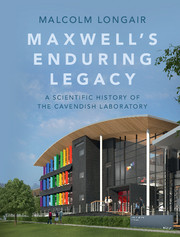Book contents
- Frontmatter
- Dedication
- Contents
- Preface
- Acknowledgements
- Part I To 1874
- Part II 1874 to 1879
- Part III 1879 to 1884
- Part IV 1884 to 1919
- Part V 1919 to 1937
- Part VI 1938 to 1953
- Part VII 1953 to 1971
- Part VIII 1971 to 1982
- Part IX 1984 to 1995
- Part X 1995 to present
- 22 Towards the newmillenium and beyond
- Appendix The evolution of the New Museums site
- Notes
- References
- Author index
- Subject index
22 - Towards the newmillenium and beyond
from Part X - 1995 to present
Published online by Cambridge University Press: 05 July 2016
- Frontmatter
- Dedication
- Contents
- Preface
- Acknowledgements
- Part I To 1874
- Part II 1874 to 1879
- Part III 1879 to 1884
- Part IV 1884 to 1919
- Part V 1919 to 1937
- Part VI 1938 to 1953
- Part VII 1953 to 1971
- Part VIII 1971 to 1982
- Part IX 1984 to 1995
- Part X 1995 to present
- 22 Towards the newmillenium and beyond
- Appendix The evolution of the New Museums site
- Notes
- References
- Author index
- Subject index
Summary
The end of history?
The Regius Professor of History, on being asked, ‘When does history end?’, responded, ‘When they can no longer sue!’ More pertinently, I was deeply involved in managing the Laboratory from the time ofmy return to Cambridge in 1991 until the present. Any pretense at objectivity would scarcely be credible. As a consequence, this chapter is more personal than the rest of the text, but I will endeavour to stick to the facts.
The changes in the named professorships through this period were as follows:
• Richard Friend appointed Cavendish Professor in 1995 at the age of 42 in succession to Sam Edwards
• Peter Littlewood appointed to the 1966 Professorship of Theoretical Physics in succession to Volker Heine in 1997; in 2013, this chair was transferred to Didier Queloz
• Henning Sirringhaus appointed to the Hitachi Professorship of Electron Device Physics in 2005
• Ullrich Steiner appointed John Humphrey Plummer Professor of Physics in 2005
• Jeremy Baumberg appointed Professor of Nanoelectronics, proleptically filling the Chair of Physics held by Michael Pepper in 2007
• James Stirling appointed Jacksonian Professor of Natural Philosophy following my retirement from the chair in 2008
• Ben Simons appointed to the Herchel Smith Professorship of the Physics of Medicine in 2011
• Roberto Maiolino appointed Professor of Astrophysics in succession to Richard Hills in 2012.
The Heads of Department during this period were:
• Archie Howie: 1990–97
• Malcolm Longair: 1997–2005
• Peter Littlewood: 2005–11
• James Stirling: 2011–13
• Andy Parker: 2013–present.
The days when Rutherford could manage the Cavendish Laboratory as a single dominating presence or Thomson manage the finances of the Laboratory from his personal cheque-book were long gone. The role of the Head of Department was much more that of the chief executive officer of a middle-sized company. By 2015 the number of persons on site was approaching 1000 and the turnover about £30 million. All those who have held the post of Head of Department since 1995 have found that, in the research funding and educational climate of the late twentieth and early twenty-first centuries, the role has become very much more demanding and time-consuming than might be expected of an academic institution. How did this come about?
- Type
- Chapter
- Information
- Maxwell's Enduring LegacyA Scientific History of the Cavendish Laboratory, pp. 521 - 560Publisher: Cambridge University PressPrint publication year: 2016



